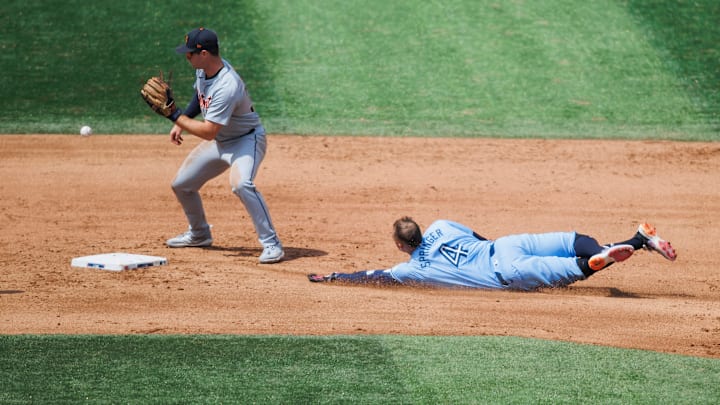Tigers and Royals massive turnarounds puts pressure on Blue Jays this offseason
Kansas City spent $100M on seven free agents last offseason, signed their emerging MVP-candidate Bobby Witt Jr. to a massive 11-year, $289M extension, and were buyers at the July Trade Deadline. That’s propelled them to a Passan Award for teams and players “who did cool things” in 2024, with the Royals winning the coveted “Biggest Surprise” category.
They also made a 180-degree turn from a 106-loss season in 2023 to a Wild Card this year. But their playoff odds were solidly above 50% from mid-May through mid-June, and stayed there since late July.
With over $60M in contracts dropping off from the Blue Jays’ Opening Day payroll, that’s certainly one blueprint for the Toronto front office on how to turn things around this make-or-break offseason.
The Tigers and Blue Jays were both stuck below 1% playoff odds after they sold their players on expiring contracts at the July 30 Deadline. Since then, Tigers ace Tarik Skubal went 6-1 with a 2.47 ERA in 10 starts and 62 innings. Rookie Keider Montero went 5-2 with a 3.33 ERA is 10 starts and 54 innings since Flaherty was dealt to the Dodgers for two prospects.
Surprisingly, the Blue Jays had better starting pitching than Detroit though, with Kevin Gausman, José Berríos and Bowden Francis combining to go 16-8 with a 2.37 ERA over 29 starts and 182 innings since the Trade Deadline.
Even more surprising is the fact that Toronto outscored Detroit 224-223 and hit more home runs than them at 55-50 since then. So what explains the wildly different outcomes in terms of how the rest of their seasons played out, with Detroit advancing to the post season and Toronto sputtering to a last place finish in the AL East?
If you guessed relief pitching, you’re partly right. Toronto’s bullpen blew 10 saves and lost 12 games in 179 innings pitched since July 30. Detroit’s bullpen, which logged more innings as a result of using an opener and a guy more often, blew 8 saves and lost 13 games in 288 innings over the same stretch. But they also won 22 games and posted a 2.80 ERA and 3.55 FIP to Toronto’s 4.57 ERA and 4.68 FIP.
The other huge contrast has been the play of Detroit’s younger players. Given the opportunity to play more after the Deadline, players like Parker Meadows, Kerry Carpenter, Matt Vierling, Riley Greene and Colt Keith have stepped up and seized the moment.
In addition to rookie starter Keider Montero and 27-year-old likely AL Cy Young winner Skubal, relievers Tyler Holton, Brant Hurter, Brenan Hanifee, Will Vest, Beau Brieske, Sean Guenther and closer Jason Foley have been outstanding.
All of them are under 30-years of age. In fact, Detroit features MLB’s youngest roster at an average age of 26.3-years. Toronto’s current roster is almost two full years older on average. Detroit has done what Mark Shapiro initially promised Blue Jays fans after his hiring; they’ve produced waves of MLB-ready talent from a highly ranked farm system.
To add insult to injury for Blue Jays fans, Detroit recently called up the top pitching prospect in all of baseball, 22-year-old Jackson Jobe, who features a wipeout slider that is reminscient of Dave Stieb nastiness. He also topped out at 99.3 mph in his first MLB inning last Wednesday.
Jackson Jobe's first Major League game and he closes the door on another @Tigers win 🤩 pic.twitter.com/BjZjkbj29K
— MLB (@MLB) September 26, 2024
He was promoted from a Tigers farm system that MLB Pipeline ranked No. 6 overall in their midseason update, with five top 100 prospects including Jobe. That compares to zero top 100 prospects in the No. 24 ranked Blue Jays farm system… and Detroit graduated Colt Keith this year.
Recent Blue Jays additions like Will Wagner and Joey Loperfido come up short in comparison to Keith and Greene given Wagner’s injury and Loperfido’s struggles hitting the fastball. Top hitting prospect Orelvis Martinez whiffed his opportunity to play at the big league level following an 80-game PED suspension.
And Toronto’s farm system couldn’t produce anyone like Montero, Holton or Foley to step up when Alek Manoah and Jordan Romano were injured, and Erik Swanson and others were ineffective.
Meanwhile, Toronto has a competitive balance (“luxury tax”) payroll somewhere between $236M ~ $240M for 2024, while Detroit sits at $114M. Rookie Colt Keith signed a 6-year contract extension covering his arbitration eligible years through the 2029 season… before he’d ever even had an MLB at bat.
Detroit has club options on Keith for the 2030, 2031 and 2032 seasons, and the total contract could be worth $82M over nine years if all of the options are escalated and exercised. Vladimir Guerrero Jr., and Bo Bichette will now both cost considerably more than that if they sign extensions to stay with Toronto.
